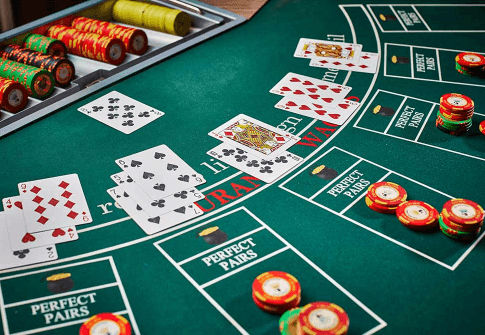Blackjack
 If you have any familiarity whatsoever with casinos either online or in real life, you have probably at least heard of the game of blackjack. This game is, by far, one of the most popular casino games in the world and for good reason too. Not only are the odds reasonable, the game itself is quite simple to understand and has little grey areas or room for interpretation.
If you have any familiarity whatsoever with casinos either online or in real life, you have probably at least heard of the game of blackjack. This game is, by far, one of the most popular casino games in the world and for good reason too. Not only are the odds reasonable, the game itself is quite simple to understand and has little grey areas or room for interpretation.
Where and when blackjack officially got its start is not known for certain, but most historians agree that iterations of the game were played in 18th century France. Since then, the game has evolved and grown into the 52-card game of 21 that we know today.
A concise explanation of blackjack will tell you that the game pits player versus dealer in a battle to see who can accrue cards coming close to, or totaling, 21 without going over. Whoever ends up with the higher card count without going over 21 is determined to be the winner. While it is really that simple, a more in-depth explanation will be provided below.
Blackjack Explained
The section above does well to explain what the ultimate goal of blackjack is: to get to or as close to 21 as possible. What it doesn’t do is tell you how you determine just how close to 21 you actually are. This is where card values come into play. In the game of blackjack, there will be a total of 52 cards in play (in single-deck).
Card Values
Numbered cards (ie. 2-10) will be worth the listed value. So, for example, a 2 of hearts gives you 2. All face cards will hold a value of 10, and the Ace has the luxury of being worth either 1 or 11 depending on what suits you best. For example, if you have an 8 and an Ace in front of you, most would argue that it would be more advantageous to treat the Ace as 11 so that your total hand is worth 19—a rather tough hand to beat.
The Deal – Hitting and Standing Pat
Action in the game of blackjack first begins with the dealer who deals each player at a table two cards, both of which are visible to everyone. The dealing culminates with the dealer giving him or herself 2 cards, with only 1 facing upward. At this juncture, anyone who has hit blackjack will be paid out immediately and their hand will be over.
To record a “blackjack,” your first two cards must be some combination of an Ace and either a face card or a 10. If you have any other combination of cards, you will be asked to hit or stand. Hitting will see the dealer give you an additional card, while standing means you are content with what is in front of you and think that it is enough to best the dealer’s hand.
If you have, for example, a 10 and 5 laying in front of you and you decide to hit, you are risking what is known as “busting,” or exceeding 21. Continuing with this example, if you hit on 15 and receive a 7, you will have busted, your bet will be forfeited, and your round is over.
Once everyone has decided to either hit or stand, the dealer will then flip over their single face-down card and play the game out just as everyone else has already done. If the cards with which you stood end up besting those of the dealer, you will win. If the dealer manages to hit blackjack or simply reach a total that exceeds your standing amount, you lose.
Other Rules To Know
While this game is fairly straightforward, there are aspects that you would do well to know and understand. For example, if the 2 cards which you are dealt are identical (ie. Two 3s), you have the option of splitting them up, receiving 2 more cards (one for each of the split pair), and playing out the hand with 2 hands happening simultaneously. Keep in mind, however, that if you decide to split, you will be forced to double down on your initial wager.
Another option is to double down. “Doubling” simply means that you double your bet, receive one more card, and hope for the best. If the 3rd card causes you to bust, you lose. If the 3rd card does not cause you to bust, you are simply holding out hope that your hand is superior to that of the dealer’s.
In the event that your cards and those of the dealer’s are identical, this is referred to as a “push” with the outcome being that no one is a winner and all wagered funds are returned.
If the dealer’s 2 cards total 17, they are almost always forced to stand at that amount. If the value of the dealer’s hand is less than 16, they are forced to hit. Finally, if both you and the dealer achieve blackjack, this is also a push and no outright winner is determined.
When it comes to online casinos in New Jersey, blackjack is a dominant force that can be found on most every site. In fact, apart from the game just described above, most online casinos feature many different variations from the classic form of the game.
